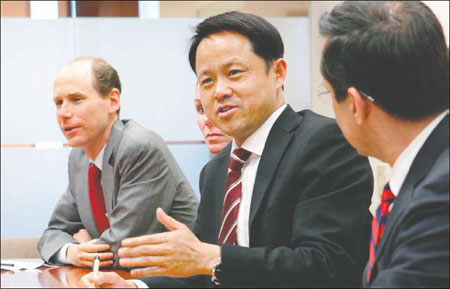US, Chinese law schools to deepen collaboration
Updated: 2013-05-23 11:09
By Caroline Berg in New York (China Daily)
|
||||||||
|
Wang Xixin, deputy dean and professor of law at Peking University Law School, and Benjamin Liebman (far left), Robert L. Lieff professor of law, spoke at the memorandum of understanding signing ceremony held earlier this month. Provided to China Daily |
"There's a lot of interest in developing joint research on issues like anti-trust regulations in China and the development of China's courts, but we don't have a specific research agenda going in," Liebman said.
Other possible opportunities include joint publications and hosting joint seminars and forums.
"In my view, the real goal and the strength of this relationship is the effort to work together on common issues," Liebman said. "It's not that we're studying them or they're studying us, but rather we're looking at common questions that face our countries and face the global legal framework together."
Over years, hundreds of exchanges have occurred between the two schools to conduct research, serve as visiting professors, participate in conferences, and advise on developing new laws. Liebman estimated 50 to 60 Chinese students and scholars are at Columbia annually.
"We have a huge network of people already in China who study here and spent time here [at Columbia], and that's a great resource for us," Liebman said.
Scholars from Peking University Law School regularly partner with the Chinese government, law firms and the business community.
"The legal system today without question has developed more than anyone thought possible when legal reform [in China] started in 1978," Liebman said. "There are a lot of problems continuing to face the legal system, but the speed of change continues to be impressive."
Carter said she was impressed by students' "very insightful" questions, not to mention their command of English. She told the first few students who raised their hands that she could spend an entire semester answering their questions, which pinpointed some of the biggest and most complex issues in the field of mediation today.
"Students asked questions about access to justice and how judges decide which cases got to mediation and which cases go before the judge," Carter said. "This is a topic of much discussion in the US."
Carter said she met with the Peking University Law School dean and vice dean over the week to discuss the Chinese school's priorities and to explore future collaborations that would utilize the mediation program Carter teaches at Columbia.
She also met with other professors and local lawyers to discuss holding a conference on the future of mediation in China and ways in which academics can support the work that the judiciary is doing in this area.
"[Peking University] is a real leader in China," Carter said. "They have some of the very best scholars and practitioners there, so there's a lot of opportunity for joint research and joint teaching that I think is unmatched."
In lieu of pay, the Chinese university covered expenses for Carter's housing and most meals, as well as escorted her around campus and made introductions to help her extend her professional network.
Carter said, "I think the people who are taking this opportunity are doing it because they see genuine opportunities for collaboration with a great institution like [Peking University]."
carolineberg@chinadailyusa.com
(China Daily 05/23/2013 page2)

 Michelle lays roses at site along Berlin Wall
Michelle lays roses at site along Berlin Wall
 Historic space lecture in Tiangong-1 commences
Historic space lecture in Tiangong-1 commences
 'Sopranos' Star James Gandolfini dead at 51
'Sopranos' Star James Gandolfini dead at 51
 UN: Number of refugees hits 18-year high
UN: Number of refugees hits 18-year high
 Slide: Jet exercises from aircraft carrier
Slide: Jet exercises from aircraft carrier
 Talks establish fishery hotline
Talks establish fishery hotline
 Foreign buyers eye Chinese drones
Foreign buyers eye Chinese drones
 UN chief hails China's peacekeepers
UN chief hails China's peacekeepers
Most Viewed
Editor's Picks

|

|

|

|

|

|
Today's Top News
Shenzhou X astronaut gives lecture today
US told to reassess duties on Chinese paper
Chinese seek greater share of satellite market
Russia rejects Obama's nuke cut proposal
US immigration bill sees Senate breakthrough
Brazilian cities revoke fare hikes
Moody's warns on China's local govt debt
Air quality in major cities drops in May
US Weekly

|

|









